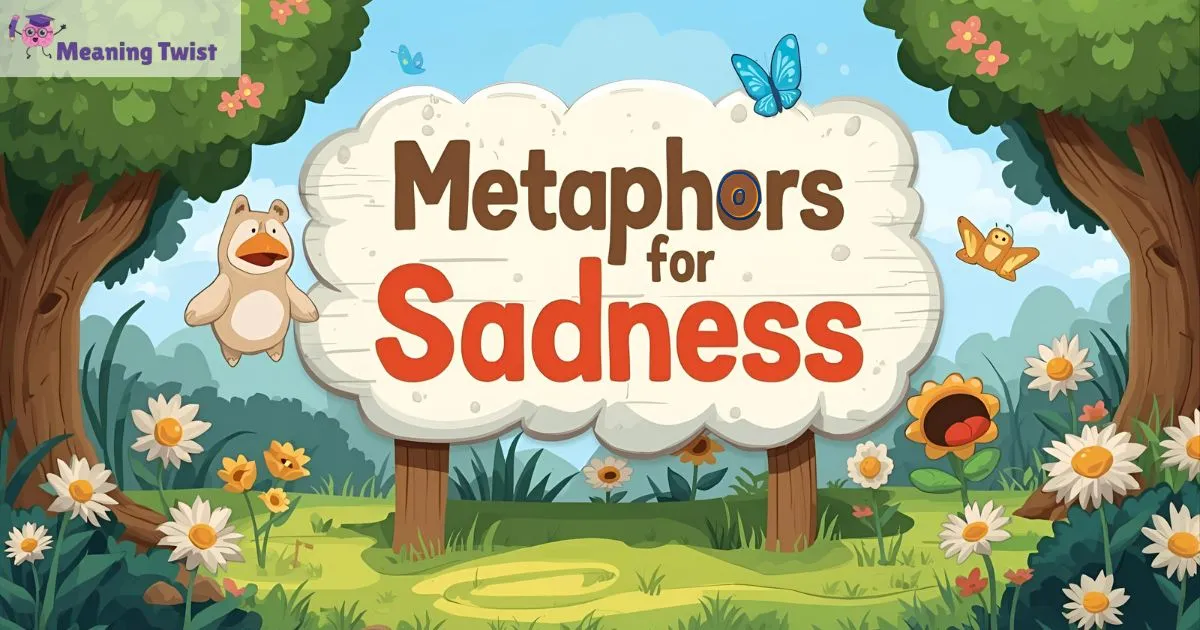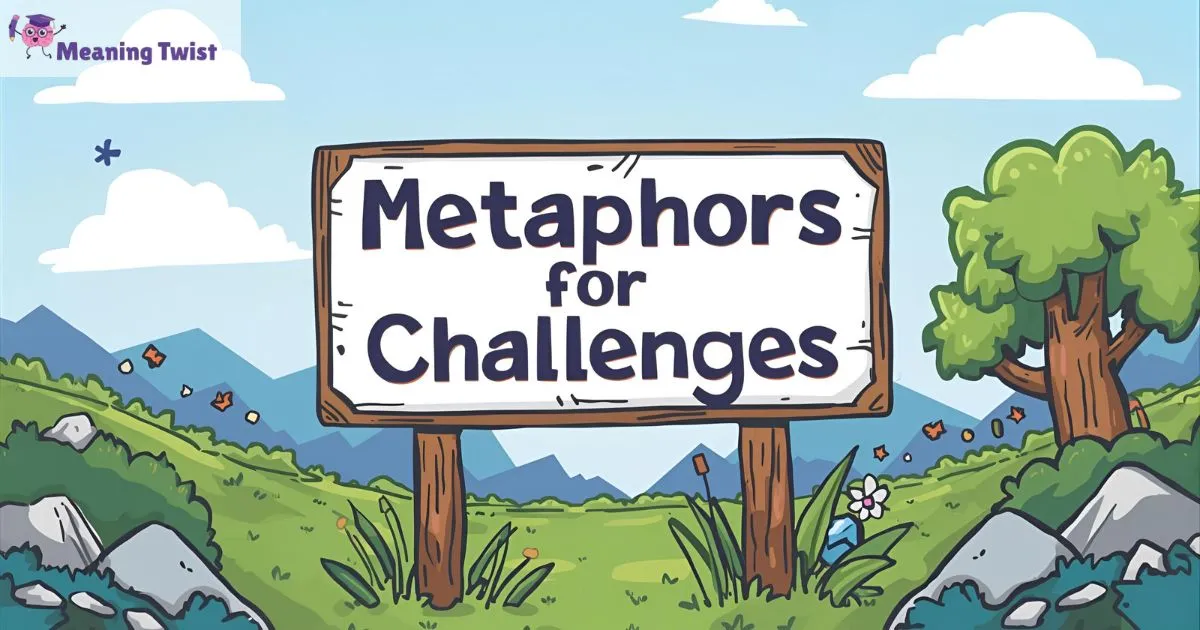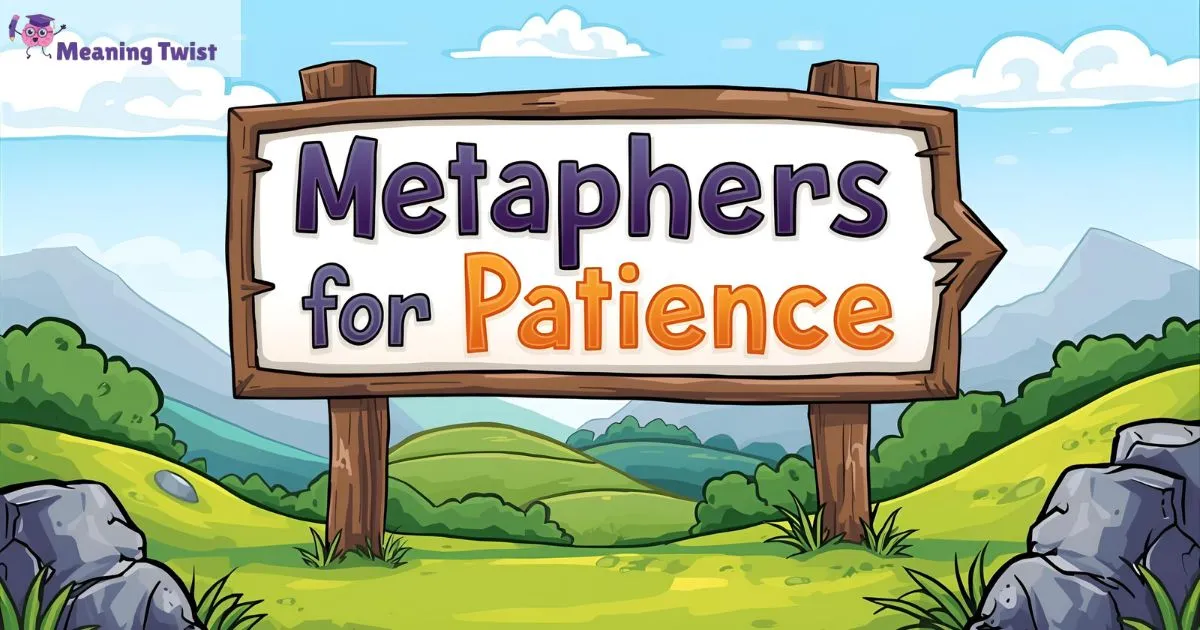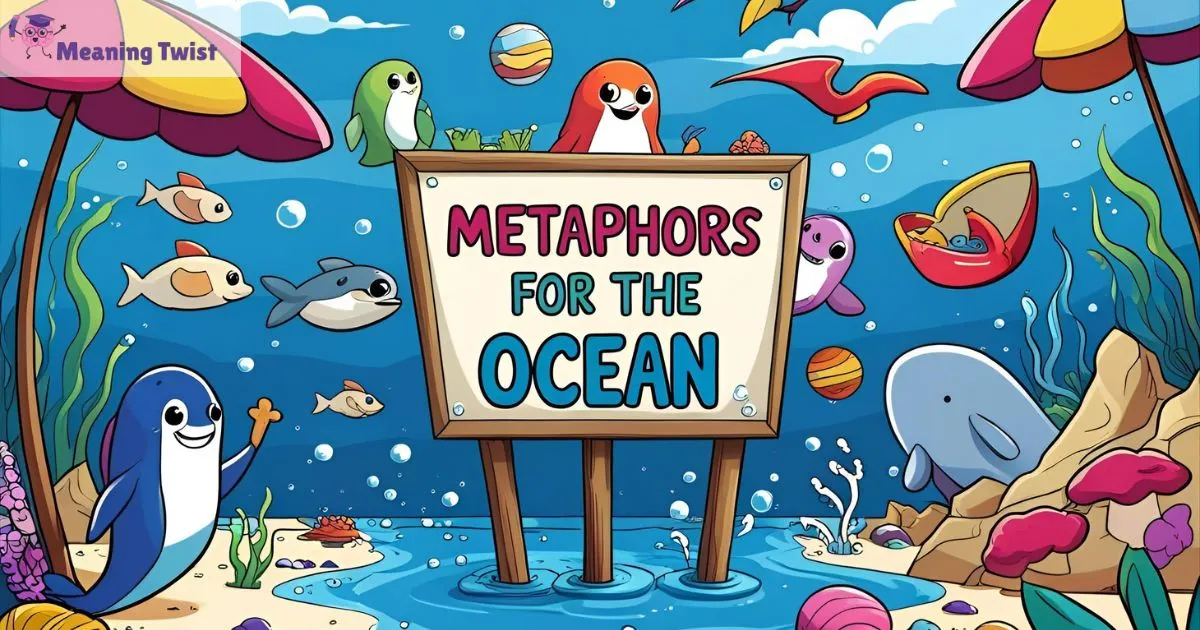Metaphors for Sadness help us describe heavy feelings in a colorful, creative way instead of just saying “I’m sad.” A metaphor is like a mini story or picture made with words it compares one thing to another to make ideas easier to feel and imagine. Using metaphors lets writers and speakers express emotions, situations, or moods without being direct, which makes language richer and more memorable.
For example, saying “Her heart was a rainy cloud” paints sadness as a dark, gloomy cloud hovering inside someone instantly showing a feeling without spelling it out. Just like using food metaphors can make “hungry feelings” tastier or animal metaphors can show “wild emotions,” sadness metaphors bring emotions to life in creative ways.
Get ready to explore Metaphors for Sadness and discover how you can use them every day to describe feelings with flair and imagination!
Best Metaphors for Sadness
1. The Weight of Sorrow
Meaning:
This metaphor shows sadness as something heavy that feels like it’s pressing on you.
When to Use It:
Use it when describing deep sadness, disappointment, or grief.
In a Sentence:
- I felt the weight of sorrow when my favorite toy broke.
- She carried the weight of sorrow after losing her pet.
Other Ways to Say:
- Heavy sadness
- Burden of grief
- Emotional weight
Fun Tip or Visual Clue:
💡 Imagine carrying a big backpack full of rocks that’s the weight of sorrow!
2. Tears Like Rivers
Meaning:
This metaphor shows crying a lot, as if tears are flowing like rivers.
When to Use It:
Use it when describing strong emotions, sadness, or crying.
In a Sentence:
- I had tears like rivers when I fell and scraped my knee.
- They had tears like rivers during the sad story at school.
Other Ways to Say:
- Flowing tears
- Heavy crying
- Emotional streams
Fun Tip or Visual Clue:
💡 Imagine rivers flowing from your eyes that’s tears like rivers!
3. Shadows in the Mind
Meaning:
This metaphor shows feelings of worry, fear, or sadness lurking in your thoughts.
When to Use It:
Use it when describing anxiety, fears, or dark thoughts.
In a Sentence:
- I noticed shadows in the mind when I worried about the test.
- They felt shadows in the mind after hearing sad news.
Other Ways to Say:
- Dark thoughts
- Worries inside
- Mental shadows
Fun Tip or Visual Clue:
💡 Imagine shadows creeping around in a room that’s your mind feeling heavy.
4. An Empty Room
Meaning:
This metaphor shows loneliness, emptiness, or a quiet place with no one around.
When to Use It:
Use it when describing feeling alone, missing someone, or silence.
In a Sentence:
- I felt like an empty room when my friends went home.
- She felt an empty room inside after the party ended.
Other Ways to Say:
- Lonely space
- Quiet room
- Hollow feeling
Fun Tip or Visual Clue:
💡 Imagine a room with nothing inside that’s the emptiness feeling!
5. A Flickering Candle
Meaning:
This metaphor shows hope or life that feels weak or unsteady.
When to Use It:
Use it when describing fragile hope, courage, or energy.
In a Sentence:
- I held on to a flickering candle of hope during the difficult game.
- They kept a flickering candle of hope while waiting for good news.
Other Ways to Say:
- Weak light
- Shaky hope
- Gentle flame
Fun Tip or Visual Clue:
💡 Imagine a candle flickering in the wind that’s fragile hope!
Read More: Metaphors For Scared That Turn Terror Into Comedy
6. Waves of Melancholy
Meaning:
This metaphor shows sadness coming and going like waves in the ocean.
When to Use It:
Use it when describing ups and downs in emotions.
In a Sentence:
- I felt waves of melancholy when I remembered my old school.
- She experienced waves of melancholy thinking about moving away.
Other Ways to Say:
- Rolling sadness
- Emotional tides
- Sorrow waves
Fun Tip or Visual Clue:
💡 Imagine waves gently rolling in and out that’s how sadness comes and goes!
7. A Fading Sunset
Meaning:
This metaphor shows beauty or happiness disappearing slowly, like the sun setting.
When to Use It:
Use it when describing endings, loss, or quiet moments.
In a Sentence:
- I watched a fading sunset, feeling calm but a little sad.
- They noticed a fading sunset as the day came to an end.
Other Ways to Say:
- Disappearing light
- Ending beauty
- Sunset glow
Fun Tip or Visual Clue:
💡 Imagine the sun slowly going down and the sky getting darker that’s a fading sunset!
8. The Silence Between Words
Meaning:
This metaphor shows moments when no one talks, filled with emotion or tension.
When to Use It:
Use it when describing awkwardness, sadness, or reflection.
In a Sentence:
- I felt the silence between words after the argument.
- They shared the silence between words when thinking deeply.
Other Ways to Say:
- Quiet pauses
- Unspoken feelings
- Wordless moments
Fun Tip or Visual Clue:
💡 Imagine a quiet pause in a conversation that’s the silence between words!
9. A Wilted Flower
Meaning:
This metaphor shows sadness, weakness, or loss, like a flower losing its petals.
When to Use It:
Use it when describing tiredness, grief, or fading happiness.
In a Sentence:
- I felt like a wilted flower after losing the race.
- She looked like a wilted flower when she heard the bad news.
Other Ways to Say:
- Drooping flower
- Fading bloom
- Weak petals
Fun Tip or Visual Clue:
💡 Imagine a flower drooping slowly that’s the wilted flower feeling!
10. A Lonely Path
Meaning:
This metaphor shows a journey or life that feels quiet, solitary, or difficult.
When to Use It:
Use it when describing feeling alone, isolated, or facing challenges.
In a Sentence:
- I walked a lonely path when I was the only one trying the puzzle.
- They followed a lonely path through the empty playground.
Other Ways to Say:
- Solitary road
- Quiet journey
- Isolated way
Fun Tip or Visual Clue:
💡 Imagine a path with no one around that’s a lonely path!
11. The Cold of Winter
Meaning:
This metaphor shows sadness, loneliness, or emptiness as something cold and harsh.
When to Use It:
Use it when describing isolation, sadness, or hard times.
In a Sentence:
- I felt the cold of winter when my friends moved away.
- She experienced the cold of winter after losing her pet.
Other Ways to Say:
- Chilly sadness
- Frosty feelings
- Lonely cold
Fun Tip or Visual Clue:
💡 Imagine shivering in icy air that’s the cold of winter feeling!
12. Echoes of Loss
Meaning:
This metaphor shows sadness that lingers, like sound echoing in a canyon.
When to Use It:
Use it when describing lingering sadness or grief.
In a Sentence:
- I felt echoes of loss when I remembered my broken toy.
- They heard echoes of loss after saying goodbye to their teacher.
Other Ways to Say:
- Lingering sorrow
- Lasting sadness
- Emotional echoes
Fun Tip or Visual Clue:
💡 Imagine your voice bouncing back in a canyon that’s how loss echoes!
13. A Flickering Flame of Hope
Meaning:
This metaphor shows hope as a small light that can grow or disappear.
When to Use It:
Use it when describing fragile hope or perseverance.
In a Sentence:
- I held a flickering flame of hope while waiting for good news.
- They kept a flickering flame of hope through the stormy day.
Other Ways to Say:
- Weak hope
- Shaky courage
- Gentle optimism
Fun Tip or Visual Clue:
💡 Imagine a candle flickering in the wind that’s fragile hope!
14. A Hollow Chest
Meaning:
This metaphor shows emptiness inside, like a box with nothing in it.
When to Use It:
Use it when describing sadness, loss, or missing something important.
In a Sentence:
- I felt a hollow chest when my favorite toy was lost.
- She felt a hollow chest after moving to a new school.
Other Ways to Say:
- Empty heart
- Void inside
- Hollow feelings
Fun Tip or Visual Clue:
💡 Imagine opening a box and finding nothing that’s a hollow chest!
15. The Depths of Despair
Meaning:
This metaphor shows feeling very sad or hopeless, as if sinking deep underwater.
When to Use It:
Use it when describing strong sadness, disappointment, or struggle.
In a Sentence:
- I felt the depths of despair when I lost the game.
- They faced the depths of despair after a storm ruined the picnic.
Other Ways to Say:
- Deep sorrow
- Hopeless feeling
- Emotional abyss
Fun Tip or Visual Clue:
💡 Imagine sinking deep underwater that’s the depths of despair!
16. A Lost Star
Meaning:
This metaphor shows something or someone precious being missing.
When to Use It:
Use it when describing loss, sadness, or longing.
In a Sentence:
- I felt like a lost star when my friend moved away.
- She imagined a lost star shining somewhere far from home.
Other Ways to Say:
- Missing treasure
- Faded light
- Absent star
Fun Tip or Visual Clue:
💡 Imagine looking for a bright star that’s gone that’s a lost star feeling!
17. Heavy Clouds Overhead
Meaning:
This metaphor shows sadness or worry looming above, like dark clouds.
When to Use It:
Use it when describing anxiety, trouble, or gloom.
In a Sentence:
- I felt heavy clouds overhead when the homework was hard.
- They experienced heavy clouds overhead during a rainy day.
Other Ways to Say:
- Dark feelings
- Burdened mind
- Gloomy thoughts
Fun Tip or Visual Clue:
💡 Imagine dark clouds blocking the sun that’s heavy clouds overhead!
18. A Dimming Light
Meaning:
This metaphor shows hope, energy, or joy slowly fading away.
When to Use It:
Use it when describing weakness, loss, or growing sadness.
In a Sentence:
- I felt a dimming light when my team lost the match.
- She noticed a dimming light inside when her favorite game ended.
Other Ways to Say:
- Fading hope
- Weak glow
- Shrinking joy
Fun Tip or Visual Clue:
💡 Imagine a lamp slowly losing its glow that’s a dimming light!
19. A Fractured Mirror
Meaning:
This metaphor shows brokenness, confusion, or a hurtful feeling inside.
When to Use It:
Use it when describing disappointment, conflict, or emotional cracks.
In a Sentence:
- I felt like a fractured mirror after my toy broke.
- They felt a fractured mirror inside after an argument with friends.
Other Ways to Say:
- Broken reflection
- Shattered feelings
- Cracked emotions
Fun Tip or Visual Clue:
💡 Imagine a mirror breaking into pieces that’s a fractured mirror feeling!
Read More: Metaphors For School That Bring Learning to Life
20. The Weight of Memories
Meaning:
This metaphor shows memories that feel heavy, sometimes sad or hard to carry.
When to Use It:
Use it when describing nostalgia, loss, or reflection.
In a Sentence:
- I carried the weight of memories thinking about last year’s summer.
- She felt the weight of memories when looking at old photos.
Other Ways to Say:
- Heavy thoughts
- Burdened mind
- Emotional load
Fun Tip or Visual Clue:
💡 Imagine carrying a backpack full of old letters that’s the weight of memories!
21. A Deserted Playground
Meaning:
This metaphor shows loneliness, emptiness, or sadness where once there was fun.
When to Use It:
Use it when describing isolation, quiet places, or missing friends.
In a Sentence:
- I felt a deserted playground when no one came to play.
- They walked past a deserted playground, feeling lonely.
Other Ways to Say:
- Empty space
- Lonely area
- Silent playground
Fun Tip or Visual Clue:
💡 Imagine a swing moving by itself with no one there that’s a deserted playground!
22. A Withered Tree
Meaning:
This metaphor shows tiredness, loss, or sadness, like a tree losing its leaves.
When to Use It:
Use it when describing weakness, aging, or loss.
In a Sentence:
- I felt like a withered tree after losing the game.
- She looked like a withered tree when her friend moved away.
Other Ways to Say:
- Drooping tree
- Faded plant
- Weak branch
Fun Tip or Visual Clue:
💡 Imagine a tree without leaves that’s a withered tree feeling!
23. The Chill of Loneliness
Meaning:
This metaphor shows sadness or being alone as something cold.
When to Use It:
Use it when describing isolation, missing friends, or quietness.
In a Sentence:
- I felt the chill of loneliness when my friends left.
- She experienced the chill of loneliness in the empty house.
Other Ways to Say:
- Cold sadness
- Isolated feeling
- Frosty heart
Fun Tip or Visual Clue:
💡 Imagine shivering with no one around that’s the chill of loneliness!
24. A Shattered Glass
Meaning:
This metaphor shows brokenness or fragile feelings that are hard to fix.
When to Use It:
Use it when describing disappointment, sadness, or failure.
In a Sentence:
- I felt like a shattered glass when my tower of blocks fell.
- She experienced a shattered glass feeling after losing her pet.
Other Ways to Say:
- Broken feelings
- Cracked emotions
- Fragile heart
Fun Tip or Visual Clue:
💡 Imagine dropping a glass that shatters that’s a shattered glass feeling!
25. A Silent Scream
Meaning:
This metaphor shows strong emotion, like fear or sadness, without making noise.
When to Use It:
Use it when describing frustration, pain, or quiet despair.
In a Sentence:
- I felt a silent scream when I stubbed my toe.
- They held a silent scream inside during the scary story.
Other Ways to Say:
- Wordless cry
- Quiet anguish
- Inner shout
Fun Tip or Visual Clue:
💡 Imagine shouting inside your head but no sound comes out that’s a silent scream!
26. A Falling Leaf
Meaning:
This metaphor shows sadness, loss, or change, like a leaf drifting from a tree.
When to Use It:
Use it when describing endings, letting go, or transitions.
In a Sentence:
- I felt like a falling leaf when my friends moved away.
- She felt like a falling leaf when summer ended.
Other Ways to Say:
- Drifting leaf
- Lost leaf
- Autumn leaf
Fun Tip or Visual Clue:
💡 Imagine a leaf slowly floating to the ground that’s a falling leaf feeling!
27. A Night Without Moonlight
Meaning:
This metaphor shows darkness, sadness, or feeling lost without guidance.
When to Use It:
Use it when describing loneliness, fear, or confusion.
In a Sentence:
- I felt like a night without moonlight when I couldn’t find my way.
- They experienced a night without moonlight during the blackout.
Other Ways to Say:
- Dark night
- Moonless sky
- Shadowy evening
Fun Tip or Visual Clue:
💡 Imagine a night sky with no moon at all that’s the feeling!
28. A Burdened Soul
Meaning:
This metaphor shows feeling heavy with sadness, worry, or responsibility.
When to Use It:
Use it when describing grief, guilt, or deep emotions.
In a Sentence:
- I carried a burdened soul after disappointing my team.
- She had a burdened soul thinking about her lost pet.
Other Ways to Say:
- Heavy heart
- Weighted mind
- Troubled spirit
Fun Tip or Visual Clue:
💡 Imagine carrying a big backpack full of rocks that’s a burdened soul!
29. A Wandering Shadow
Meaning:
This metaphor shows feeling lost, lonely, or unsure, like a shadow without a home.
When to Use It:
Use it when describing confusion, sadness, or aimlessness.
In a Sentence:
- I felt like a wandering shadow when everyone left me behind.
- They moved like wandering shadows in the empty hallway.
Other Ways to Say:
- Lost shadow
- Lonely silhouette
- Drifting figure
Fun Tip or Visual Clue:
💡 Imagine a shadow walking all alone that’s a wandering shadow!
30. A Stormy Mind
Meaning:
This metaphor shows strong emotions, worries, or confusion inside your head.
When to Use It:
Use it when describing anger, fear, or troubled thoughts.
In a Sentence:
- I had a stormy mind before the big test.
- She faced a stormy mind during the argument.
Other Ways to Say:
- Turbulent thoughts
- Chaotic mind
- Emotional storm
Fun Tip or Visual Clue:
💡 Imagine clouds swirling in your head like a storm that’s a stormy mind!
Practice Exercise
- After losing her pet, Emma felt the __________ pressing down on her heart.
- During the sad movie, Jake cried __________ and needed a tissue.
- Sometimes, when Alex is worried, he sees __________ dancing in his thoughts.
- Walking into the abandoned house, Lily felt like she was in __________.
- The birthday candle was almost out, just a tiny __________ lighting the cake.
- After the rainy week, Mia felt __________ washing over her as she stared out the window.
- We watched the __________ disappear behind the hills, painting the sky orange.
- When Mom scolded me, the __________ made the room feel heavy and awkward.
- The plant on my desk looked sad, almost like a __________ after forgetting to water it.
- Tom felt like he was on __________ when he had no one to play with at recess.
- Without a warm coat, I could feel the __________ biting at my fingers.
- After Grandma passed away, I kept hearing the __________ of her laughter in my mind.
- Even though things seemed dark, Sarah held onto a __________ that things would get better.
- When Max heard the bad news, his chest felt empty, like a __________.
Answer Key
- The Weight of Sorrow
- Tears Like Rivers
- Shadows in the Mind
- An Empty Room
- A Flickering Candle
- Waves of Melancholy
- A Fading Sunset
- The Silence Between Words
- A Wilted Flower
- A Lonely Path
- The Cold of Winter
- Echoes of Loss
- A Flickering Flame of Hope
- A Hollow Chest
How to Use Metaphor for Sadness in Everyday Conversations?
Using metaphors for sadness in everyday conversations helps you express deep emotions clearly and creatively. Instead of simply saying you feel sad, describing it as “a heavy heart” or “waves of melancholy” makes your feelings more vivid and relatable.
This not only strengthens emotional connection with others but also enhances your communication skills, allowing people to truly understand your inner mood, grief, or heartache in a natural and meaningful way.
Final Word
You’re not alone if you’ve ever felt a heavy heart or waves of sadness. These emotions touch everyone at some point. Metaphors for sadness make tricky feelings easier to express, turning confusing moods into words that others can truly understand.
Whether at school, at home, or with friends, using vivid metaphors like a fading sunset or a hollow chest helps you share your emotions clearly and creatively. Next time you’re feeling this way, you’ll know exactly what to say! Keep exploring these powerful tools and use them confidently in both speaking and writing to express your heart with ease.

Hi, I am Joey, the admin of meaningtwist.com. I simplify deep meanings and twist ordinary words into extraordinary insights to spark your curiosity and clicks!




